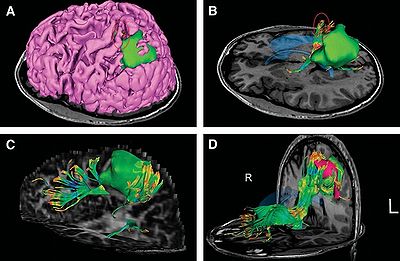Difference between revisions of "Events: DTI Tractography Challenge MICCAI 2011"
| Line 21: | Line 21: | ||
==Datasets== | ==Datasets== | ||
| + | Participants will be require to submit their tractogrpahy results for four neurosurgical cases and two non-pathological subjects. | ||
*Case 1 | *Case 1 | ||
*Case 2 | *Case 2 | ||
Revision as of 17:44, 10 March 2011
Home < Events: DTI Tractography Challenge MICCAI 2011This a proposal under consideration.
- the page is under construction
Contents
Outline
Diffusion Tensor Imaging (DTI) tractography has a unique potential for neurosurgical planning since it provides a window on the organization of white matter pathways in-vivo. During the past decade, the MICCAI community has been a major contributor to the development and refinement of a wide variety of advanced tractography techniques. This workshop will give participants the opportunity to evaluate the performances of their tractography algorithms in a neurosurgical context. Participants will gain insights on the currently available gold-standard for evaluating tractography results in the Operating Room, in the absence of ground truth.
Logistics
The DTI Tractography Challenge will be part of the MICCAI 2011 conference Sept.18-24, 2011 in Toronto, Canada.
Faculty
- Sonia Pujol, Ph.D., Surgical Planning Laboratory, Brigham and Women’s Hospital, Harvard Medical School
- Ron Kikinis, M.D., Surgical Planning Laboratory, Brigham and Women’s Hospital, Harvard Medical School
- Alexandra Golby, M.D., Department of Neurosurgery,Brigham and Women’s Hospital, Harvard Medical School
- Guido Gerig, Ph.D.,The Scientific Computing and Imaging Institute, University of Utah
- Martin Styner, Ph.D., Neuro Image Research and Analysis Laboratory, University of North Carolina
- William Wells, Ph.D., Surgical Planning Laboratory, Brigham and Women’s Hospital, Harvard Medical School
- Carl-Fredrik Westin, Ph.D., Laboratory of Mathematics in Imaging, Brigham and Women’s Hospital, Harvard Medical School
Datasets
Participants will be require to submit their tractogrpahy results for four neurosurgical cases and two non-pathological subjects.
- Case 1
- Case 2
- Case 3
- Case 4
- Subject 1
- Subject 2
